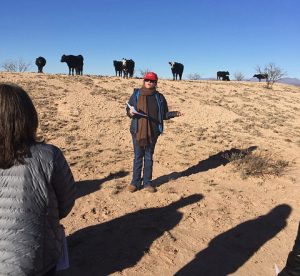This short excerpt is from an Under the Microscope interview.
David Hoover is a research ecologist at the Rangeland Resources & Systems Research Unit in Fort Collins, CO. His research is focused on how land management and climatic variability influence the ecohydrology of semiarid rangelands. He is a member of the Leadership Team, and recently served as Vice Chair of the LTAR network.

Sheri Spiegal, a research rangeland management specialist, speaks at a tour of the USDA Jornada Experimental Range, a part of the LTAR network. (Photo by Peter Kleinman)
Welcome to Under the Microscope, Dr. Hoover.
UM: What is LTAR, and why was it established?
DH: Scientists recognized that there was a need to better understand how agroecosystems adapt and respond to management across a wide range of environmental conditions; working at our own research stations was insufficient to address such complex, systems-level agricultural problems. We needed clearer ways to coordinate and compare our results as a network, rather than as individuals.
LTAR was formed in 2012 to conduct long-term research to develop and assess innovative tools and practices for resilient and sustainable agriculture. The network consists of hundreds of scientists, students, and technicians across 19 sites representing a diverse range of agroecosystems in the continental United States. It has three strategic goals:
- Improve the scientific understanding of agroecosystem function;
- Develop and test new tools, technologies, and practices that promote agricultural sustainability and resilience; and
- Enhance equitable access to scientific information, leading to the adoption of locally tailored tools and practices.